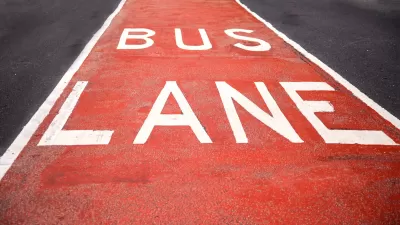Bowing to pressure from business interests, the agency says it won’t build a full busway on Fordham Road.

The New York City Department of Transportation (NYCDOT) is backing out of plans to build a busway on Fordham Road after encountering opposition from local business improvement districts (BIDs) that claim the busway would harm local businesses that “rely on car-dependent customers” and that have won support from local institutions such as the Bronx Zoo and St. Barnabas Hospital. Writing in Streetsblog NYC, Dave Colon points out that “A litany of surveys debunk this claim — including one this past March that found just 6 percent of people who drive to Little Italy on Arthur Avenue oppose a busway.”
According to Colon, the revised plan, which will “shift existing bus lanes away from the curb and extend them by several blocks” instead of a full busway, “will provide the least benefit for long-suffering bus riders.” City Council Member Pierina Sanchez expressed concern that the new plan won’t offer “significant improvements” in travel times. “DOT predicts a 20-percent bus speed improvement from the offset bus lanes versus a 30-percent speed improvement from a busway, according to a DOT spokesperson, who added that every project is unique, and as such cannot be compared to others.”
In a petition, the Riders Alliance calls on the Bronx Zoo and New York Botanical Garden to “stop fighting against better bus service now and use their substantial power to amplify riders’ demand for a busway.”
FULL STORY: DOT Nixes Fordham Road Busway Due To ‘Community Concerns’

Planetizen Federal Action Tracker
A weekly monitor of how Trump’s orders and actions are impacting planners and planning in America.

San Francisco's School District Spent $105M To Build Affordable Housing for Teachers — And That's Just the Beginning
SFUSD joins a growing list of school districts using their land holdings to address housing affordability challenges faced by their own employees.

The Tiny, Adorable $7,000 Car Turning Japan Onto EVs
The single seat Mibot charges from a regular plug as quickly as an iPad, and is about half the price of an average EV.

Vehicle-related Deaths Drop 29% in Richmond, VA
The seventh year of the city's Vision Zero strategy also cut the number of people killed in alcohol-related crashes by half.

Seattle's Plan for Adopting Driverless Cars
Equity, safety, accessibility and affordability are front of mind as the city prepares for robotaxis and other autonomous vehicles.

As Trump Phases Out FEMA, Is It Time to Flee the Floodplains?
With less federal funding available for disaster relief efforts, the need to relocate at-risk communities is more urgent than ever.
Urban Design for Planners 1: Software Tools
This six-course series explores essential urban design concepts using open source software and equips planners with the tools they need to participate fully in the urban design process.
Planning for Universal Design
Learn the tools for implementing Universal Design in planning regulations.
Smith Gee Studio
City of Charlotte
City of Camden Redevelopment Agency
City of Astoria
Transportation Research & Education Center (TREC) at Portland State University
US High Speed Rail Association
City of Camden Redevelopment Agency
Municipality of Princeton (NJ)





























